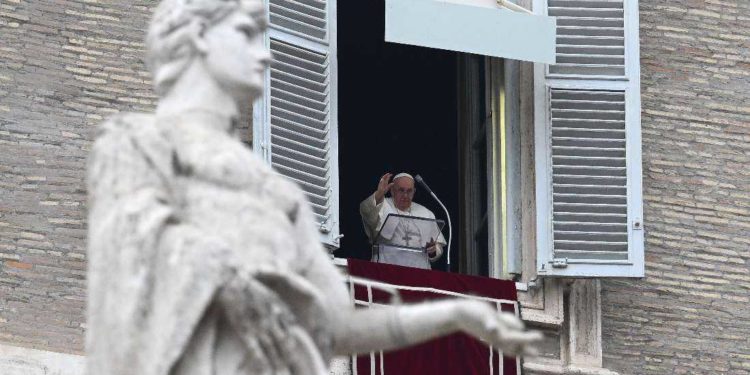An estimated 15,000 people gathered in St. Peter’s Square to pray the Angelus with Pope Francis on Jan. 15
Pope Francis waves to the crowd during his Angelus prayer from the window of the apostolic palace overlooking St Peter’s Square at the Vatican on Jan. 15. (Photo: AFP)
St. John the Baptist is a model for Christian witness, leading others to Jesus and then stepping out of the way so they follow the Lord and not the person who evangelized them, Pope Francis said.
“Think of how important this is for a priest, who is required to preach and celebrate, not out of self-importance or self-interest, but to accompany others to Jesus,” the pope told an estimated 15,000 people gathered in St. Peter’s Square Jan. 15 to pray the Angelus with him.
The day’s Gospel reading focused on St. John the Baptist’s witness that Jesus “ranks ahead of me” and is “the Lamb of God, who takes away the sin of the world.”


St. John the Baptist, who had been preaching and gathering followers, “goes from prophet to disciple,” the pope said. Yet, “he is not interested in having a following for himself, in gaining prestige and success, but he bears witness and then takes a step back, so that many would have the joy of meeting Jesus.”
In short, the pope said, St. John the Baptist “opens the door, then he leaves.”
Priests and other evangelizers must do the same, the pope said. In fact, detachment from one’s ego is a key part of the “spirit of service.”
Parents, for example, make many sacrifices for their children, but when they are grown, “they have to leave them free to take their own path in work, in marriage, in life,” the pope said. Parents obviously make clear that they always will be nearby, but they must accompany their adult children “with discretion, without intrusiveness.”
“Freeing oneself from attachments to one’s own ego and knowing how to step aside come at a cost,” he said, “but they are very important: this is the decisive step in order to grow in the spirit of service, without looking for something in return.”
Pope Francis asked people to think about how good they are at making space for others in their friendships, at work and in their parish or community by listening and not always looking for recognition.
“Do we attract others to Jesus or to ourselves?” he asked. “And furthermore, following the example of John, do we know how to rejoice in the fact that people take their own path and follow their calling, even if this entails some detachment from us? Do we rejoice in their achievements, with sincerity and without envy? This is letting others grow.”
Latest News
Credit: Source link




